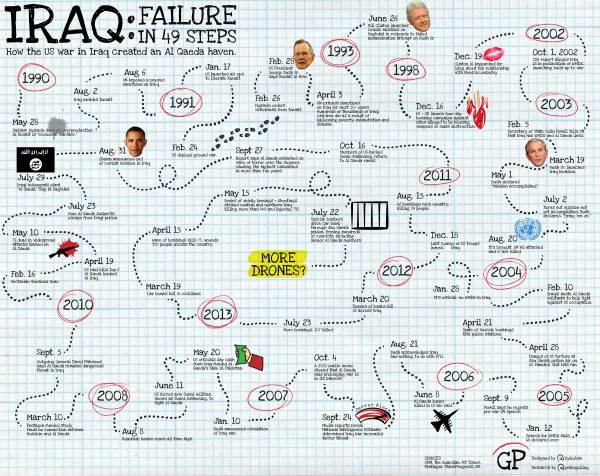Click HERE to enlarge
THE NEW YORKER: When the last American soldiers left Iraq, at the end of 2011, the bloody civil war between the country’s Sunni and Shiite sects had been stifled but not resolved. Now the sectarian violence had returned, with terrifying intensity. For more than a year, thousands of Iraqis, nearly all of them members of the Sunni Arab minority, had been gathering to rail against Maliki’s Shiite-dominated government. Although the protests were mostly peaceful, security forces responded harshly, detaining thousands of Sunni men without charges and, in one encampment, touching off a spasm of violence that left hundreds of civilians dead. Across the Sunni heartland, north and west of Baghdad, the town squares filled with angry crowds, and the rhetoric grew more extreme. In Ramadi, protesters raised black jihadi flags, representing the extremist Al Qaeda offshoot that had dominated the city during the American occupation. “We are a group called Al Qaeda!” a man shouted from a stage in the protesters’ camp. “We will cut off heads and bring justice!” The crowd cheered.
Speaking into the television cameras on Christmas, Maliki ordered the protesters to disband. Largely ignoring his own men’s excesses, he claimed that the protests were dominated by extremists. “This site has become a base for Al Qaeda,” he said, filled with “killers and criminals.” Maliki ended his speech with what for him was a flourish of emotion, lifting a hand from the lectern. “There will be no negotiations while the square is still standing.” […]
Soon afterward, troops cleared the Ramadi camp, on a day when it was sparsely occupied. Anbar Province erupted, along with the rest of Sunni Iraq, and the violence has not ceased. A wave of car bombers and suicide bombers  struck Baghdad; in January, more than a thousand Iraqi civilians died, the overwhelming majority of them Shiites, making it one of the bloodiest months since the height of the American war. In the effort to put down the upheaval, Maliki ringed the province’s two largest cities, Falluja and Ramadi, with artillery and began shelling. Forty-four Sunni members of parliament resigned. In Falluja and Ramadi, Sunni police abandoned their posts.
struck Baghdad; in January, more than a thousand Iraqi civilians died, the overwhelming majority of them Shiites, making it one of the bloodiest months since the height of the American war. In the effort to put down the upheaval, Maliki ringed the province’s two largest cities, Falluja and Ramadi, with artillery and began shelling. Forty-four Sunni members of parliament resigned. In Falluja and Ramadi, Sunni police abandoned their posts.
Maliki, apparently realizing that he had miscalculated, ordered the Army to leave both cities. Within hours, dozens of armed men, their trucks flying black flags, swept into the downtowns, declaring that they were from the Islamic State of Iraq and the Levant, an Al Qaeda splinter group. Locals said that it was made up of men who had fought the Americans. “They are sleeper cells—local people,” a Falluja resident, who watched the rebels come into the streets, told me. “Al Qaeda was here all along, lying low. And now they control Falluja.” The capture of Iraqi territory by Islamic extremists, barely two years since the last American soldiers left, prompted an extraordinary wave of soul-searching in Iraq and the United States, which lost more than thirteen hundred men and women in Anbar Province. MORE
![]() FRESH AIR: New Yorker writer Dexter Filkins finds an increasingly authoritarian prime minister — Nouri al-Maliki — sectarian violence, and concern for the future. Iraq holds parliamentary elections today. MORE
FRESH AIR: New Yorker writer Dexter Filkins finds an increasingly authoritarian prime minister — Nouri al-Maliki — sectarian violence, and concern for the future. Iraq holds parliamentary elections today. MORE
RELATED: More than 190,000 people have been killed in the 10 years since the war in Iraq began. The war will cost the U.S. $2.2 trillion, including substantial costs for veterans care through 2053, far exceeding the initial government estimate of $50 to $60 billion, according to a new report by scholars with the “Costs of War” project at Brown University’s Watson Institute for International Studies. The 10th anniversary of the U.S. invasion of Iraq is March 19, 2013. MORE
PREVIOUSLY: The Forever War

